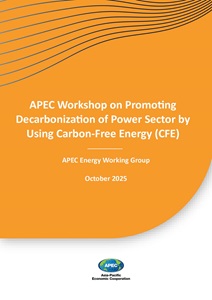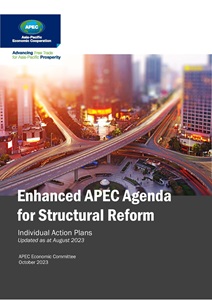
Proceedings
APEC Workshop on Promoting Decarbonization of Power Sector by Using Carbon-Free Energy (CFE)
The Asia-Pacific Economic Cooperation (APEC) is a regional economic forum established in 1989 to leverage the growing interdependence of the Asia-Pacific.
The Asia-Pacific Economic Cooperation (APEC) is a regional economic forum established in 1989 to leverage the growing interdependence of the Asia-Pacific.
APEC ensures that goods, services, investment and people move easily across borders. Members facilitate this trade through faster customs procedures at borders; more favorable business climates behind the border; and aligning regulations and standards across the region.
APEC ensures that goods, services, investment and people move easily across borders. Members facilitate this trade through faster customs procedures at borders; more favorable business climates behind the border; and aligning regulations and standards across the region.
APEC works to help all residents of the Asia-Pacific participate in the growing economy.
APEC works to help all residents of the Asia-Pacific participate in the growing economy.
Capacity building projects play an important role in helping translate APEC's goals into reality.
Capacity building projects play an important role in helping translate APEC's goals into reality.

Reports
•October 2023
Download Report
2MB
Published Under
Economic Committee (EC)
Accessed
1782
Pages
207
The Enhanced APEC Agenda for Structural Reform (EAASR) sets out new direction for growth-focused structural reform that is designed to be inclusive, sustainable and innovation-friendly, in line with the APEC Putrajaya Vision 2040 and the Aotearoa Plan of Action. The EAASR seeks to contribute to APEC’s overarching goal to promote strong, balanced, inclusive, innovative and sustainable growth, through measures in line with the following four pillars:
Under the EAASR, economies submitted individual action plans (IAPs) that outline their structural reform initiatives through to 2025. Economies were encouraged to nominate reform actions under all four pillars and across all sectors, particularly services, to ensure IAPs are suitably ambitious and comprehensive, together with quantitative and qualitative indicators to enable future monitoring and review.
This report is the collation of the IAPs submitted by APEC member economies as at August 2023. The IAPs in this compilation reflect domestic initiatives of individual APEC member economies and the content of each economy’s IAP has not been endorsed by other economies. Economies are encouraged to continuously update their IAPs as living documents through to 2025. This report may be periodically refreshed to capture new or updated IAPs.

